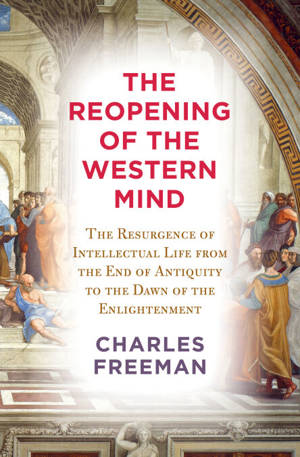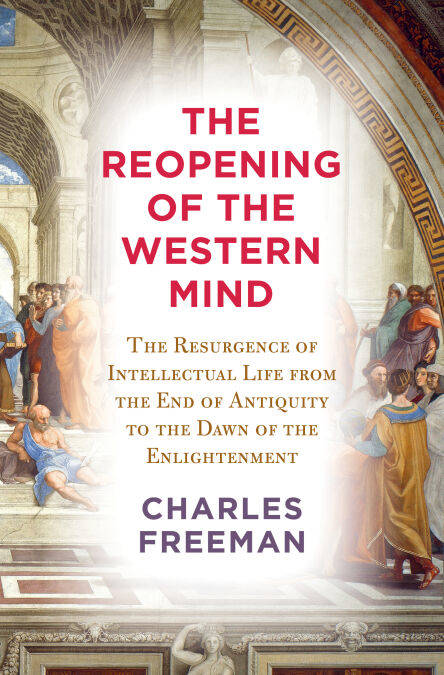
- Afhalen na 1 uur in een winkel met voorraad
- Gratis thuislevering in België vanaf € 30
- Ruim aanbod met 7 miljoen producten
- Afhalen na 1 uur in een winkel met voorraad
- Gratis thuislevering in België vanaf € 30
- Ruim aanbod met 7 miljoen producten
Zoeken
The Reopening of the Western Mind E-BOOK
The Resurgence of Intellectual Life from the End of Antiquity to the Dawn of theEnlightenment
Charles Freeman
E-book | Engels
€ 21,96
+ 21 punten
Uitvoering
Omschrijving
A monumental and exhilarating history of European thought from the end of Antiquity to the beginning of the Enlightenment—500 to 1700 AD—tracing the arc of intellectual history as it evolved, setting the stage for the modern era. With more than 140 illustrations; 90 in full-color.
Charles Freeman, lauded historical scholar and author of The Closing of the Western Mind (“A triumph”—The Times [London]), explores the rebirth of Western thought in the centuries that followed the demise of the classical era. As the dominance of Christian teachings gradually subsided over time, a new open-mindedness made way for the ideas of morality and theology, and fueled and formed the backbone of the Western mind of the late Middle Ages, the Renaissance, and beyond.
In this wide-ranging history, Freeman follows the immense intellectual development that culminated in the Enlightenment, from political ideology to philosophy and theology, as well as the fine arts and literature. He writes, in vivid detail, of how Europeans progressed from the Christian-minded thinking of Saint Augustine to the more open-minded later scholars, such as Michel de Montaigne, leading to a broader, more “humanist” way of thinking.
He explores how the discovery of America fundamentally altered European conceptions of humanity, religion, and science; how the rise of Protestantism and the Reformation profoundly influenced the tenor of politics and legal systems, with enormous repercussions; and how the radical Christianity of philosophers such as Spinoza affected a rethinking of the concept of religious tolerance that has influenced the modern era ever since.
Charles Freeman, lauded historical scholar and author of The Closing of the Western Mind (“A triumph”—The Times [London]), explores the rebirth of Western thought in the centuries that followed the demise of the classical era. As the dominance of Christian teachings gradually subsided over time, a new open-mindedness made way for the ideas of morality and theology, and fueled and formed the backbone of the Western mind of the late Middle Ages, the Renaissance, and beyond.
In this wide-ranging history, Freeman follows the immense intellectual development that culminated in the Enlightenment, from political ideology to philosophy and theology, as well as the fine arts and literature. He writes, in vivid detail, of how Europeans progressed from the Christian-minded thinking of Saint Augustine to the more open-minded later scholars, such as Michel de Montaigne, leading to a broader, more “humanist” way of thinking.
He explores how the discovery of America fundamentally altered European conceptions of humanity, religion, and science; how the rise of Protestantism and the Reformation profoundly influenced the tenor of politics and legal systems, with enormous repercussions; and how the radical Christianity of philosophers such as Spinoza affected a rethinking of the concept of religious tolerance that has influenced the modern era ever since.
Specificaties
Betrokkenen
- Auteur(s):
- Uitgeverij:
Inhoud
- Aantal bladzijden:
- 816
- Taal:
- Engels
Eigenschappen
- Productcode (EAN):
- 9780525659372
- Verschijningsdatum:
- 6/02/2023
- Uitvoering:
- E-book
- Beveiligd met:
- Adobe DRM
- Formaat:
- ePub

Alleen bij Standaard Boekhandel
+ 21 punten op je klantenkaart van Standaard Boekhandel
Beoordelingen
We publiceren alleen reviews die voldoen aan de voorwaarden voor reviews. Bekijk onze voorwaarden voor reviews.







